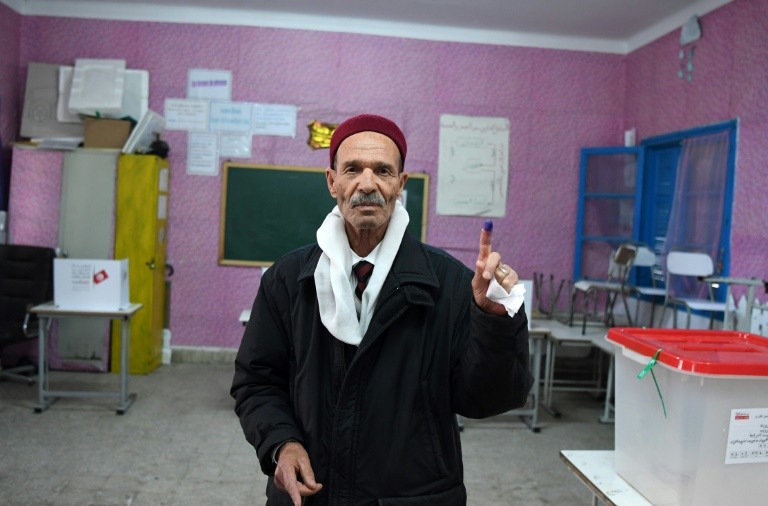
A Tunisian voter shows his ink-stained index finger after casting his ballot in the North African country's first free municipal polls since the 2011 revolution on May 6, 2018 (Photo: AFP)
Tunisia held its first free municipal elections Sunday as voters expressed frustration at the slow pace of change since the 2011 revolution in the cradle of the Arab Spring.
The election has been touted as another milestone on the road to democracy in the North African country, which has been praised for its transition from decades of dictatorship.
But Tunisia has struggled with persistent political, security and economic problems as well as corruption since the revolution, and observers expected a low turnout for Sunday's poll.
At a polling station in the capital, 58-year-old Ridha Kouki acknowledged that voting is "a right and a duty" but said Tunisians "have little hope" of any change.
Chokri Halaoui, 45, said he wanted to send a "message to politicians to tell them 'we have voted, now show us what you can do'."
But only 13.6 percent of voters had cast their ballots by midday, according to the electoral commission.
And despite bars and a clothing brand offering discounts to people with ink-stained fingers proving they had cast ballots, young voters were markedly absent from polling stations in the capital.
Unemployed graduate Kamilia Mlouki, 23, said she had come "to exercise my right" by casting a blank ballot.
"I have no more faith in any political party or electoral list," she said.
Tunisians have already voted in parliamentary and presidential elections since the 2011 fall of dictator Zine El Abidine Ben Ali, but municipal polls had been delayed four times due to logistical, administrative and political deadlocks.
President Beji Caid Essebsi has called for a "massive turnout".
Casting his ballot on Sunday, Essebsi he urged Tunisians to vote, saying "democracy cannot be imposed but must be exercised".
Rached Ghannouchi, head of the Islamist Ennahdha movement, also urged a large turnout by "young Tunisian voters", admitting however that politicians "don't hold all the keys to progress".
Tunisia is grappling with economic challenges including an inflation rate which stands at around eight percent and an unemployment rate of more than 15 percent.
The country was hit by a wave of protest at the start of the year over a new austerity budget introduced by the government.
"These municipal elections won't change anything for us. We will always be on the same cart without wheels or a horse," 34-year-old housewife Hilma told AFP ahead of the vote.
More than 57,000 candidates, half of them women and young people, are running for office in Tunisia's 350 municipalities.
Around 60,000 police and military personnel have been mobilised for the polls, while Tunisia remains under a state of emergency, imposed in 2015 after a string of deadly jihadist attacks.
European parliament vice president Fabio Castaldo, head of an EU delegation monitoring the polls, said the election was "an important step for the country's stability".
Voting will run until 6:00 pm (1700 GMT) in more than 11,000 polling stations across the country.
But in Sidi Bouzid, cradle of the 2011 revolution, and the neighbouring region of Kasserine in central Tunisia, a hotbed of protests during the revolt, polling stations will open later and close earlier for "security reasons", organisers said.
In December 2010, street vendor Mohamed Bouazizi set himself on fire and later died of his wounds in Sidi Bouzid, in a protest over unemployment and police harassment that sparked the Arab Spring.
The municipal elections, enshrined in the new constitution and one of the demands of the revolution, mark the first tangible step of decentralisation since the end of Ben Ali's rule.
Voters will elect municipal counsellors who in turn will elect mayors by mid-June.
Experts predict Tunisia's two political heavyweights -- Ghannouchi's Ennahdha movement and the secular Nidaa Tounes party founded by Essebsi -- will come out on top in nearly every district.
There remains some hope the polls will see a new generation elected into office ahead of legislative and presidential votes in 2019.
But Rafik Halouani, head of election monitor Mourakiboun, said abstention was high, particularly among the youth.
"They no longer believe in elections as a source of change, which is very serious for democracy," he said.


